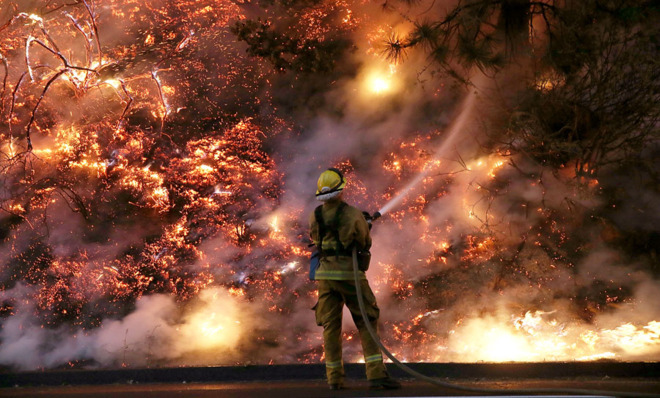Why climate change poses an 'immediate threat' to national security
A report released by the Defense Department describes climate change as a "threat multiplier." Here's why.

A free daily email with the biggest news stories of the day – and the best features from TheWeek.com
You are now subscribed
Your newsletter sign-up was successful

For years, the federal government has warned that the effects of climate change could pose serious threats to national security — saying rising water levels will eventually hinder military bases.
Now, Pentagon officials are taking a more urgent tone, warning that the changing climate poses an "immediate threat" to national security.
A new report released by the Defense Department describes climate change as a "threat multiplier" that "has the potential to exacerbate many of the challenges we are dealing with today."
The Week
Escape your echo chamber. Get the facts behind the news, plus analysis from multiple perspectives.

Sign up for The Week's Free Newsletters
From our morning news briefing to a weekly Good News Newsletter, get the best of The Week delivered directly to your inbox.
From our morning news briefing to a weekly Good News Newsletter, get the best of The Week delivered directly to your inbox.
Rising temperatures, climbing sea levels, and more extreme weather events will "intensify the challenges of global instability, hunger, poverty, and conflict," the report says. "They will likely lead to food and water shortages, pandemic disease, disputes over refugees and resources, and destruction by natural disasters in regions across the globe."
The report outlines the Pentagon's strategy to account for how the effects of climate change are already changing the world. "The impacts of climate change may cause instability in other countries by impairing access to food and water, damaging infrastructure, spreading disease, uprooting and displacing large numbers of people, compelling mass migration, interrupting commercial activity, or restricting electricity availability. The developments could undermine already-fragile governments…."
The Pentagon hasn't specified how much money it will need to adapt and respond to climate change threats. However, any additional funding for the effort is sure to be scrutinized by some Republicans in Congress — who question the scientific evidence behind climate change. Some have even suggested the DOD's report was just used to further the Obama administration's agenda to fight climate change.
"It is disappointing, but not surprising, that the president and his administration would focus on climate change when there are other, legitimate threats in the world," Senator James Inhofe (R-Okla.) the ranking Republican on the Senate Armed Services Committee and known climate change skeptic, told The New York Times.
A free daily email with the biggest news stories of the day – and the best features from TheWeek.com
Still, Pentagon officials continue warning of the seriousness of the issue, saying politics should not hinder the DOD's ability to respond to the potential threats.
"Climate change is a global problem. Its impacts do not respect national borders," Defense Secretary Chuck Hagel says in the report. "Politics or ideology must not get in the way of sound planning."
Officials conducted research and surveys to identify the biggest threats a rapidly changing climate poses to national security. Here are the five areas where the military is most vulnerable to the effects of climate change:
- Coastal bases: Rising sea levels and increased flooding pose a major threat to the thousands of coastal military installations around the world. Earlier this year, the Government Accountability Office identified 7,591 military facilities that are at risk due to the effects of climate change. In one instance, rising sea levels near Alaska have caused coastal erosion at several Air Force radar installations.
- Training: Droughts, wildfires, and extreme temperatures could derail training activities. In a recent federal audit, investigators found that nine out of 15 military areas reported difficult training conditions due to wildfires and precipitation changes, according to the GAO.
- Equipment and storage: Extreme weather events and rising waters could have serious effects on military supplies, equipment, and weapons systems. It could also change how the equipment is transported as well as where it is stored.
- Missions: Climate change will likely have a major impact on how the military executes its operations. For example, rising sea levels could hinder water landings and changing temperatures could have an impact on when to execute missions.
- Regional stability: The shortage of vital resources like food or water has the power to quickly destabilize an already vulnerable region. The CNA Military Advisory Board, made up of retired generals and admirals, recently called the effects of climate change "catalysts for conflict" in unstable regions.
More from The Fiscal Times...
-
 6 of the world’s most accessible destinations
6 of the world’s most accessible destinationsThe Week Recommends Experience all of Berlin, Singapore and Sydney
-
 How the FCC’s ‘equal time’ rule works
How the FCC’s ‘equal time’ rule worksIn the Spotlight The law is at the heart of the Colbert-CBS conflict
-
 What is the endgame in the DHS shutdown?
What is the endgame in the DHS shutdown?Today’s Big Question Democrats want to rein in ICE’s immigration crackdown